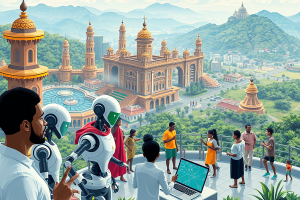
BY DARGIE KAHSAY
Science and Technology have tremendous potential to ease lives especially in developing countries where there is poor basic infrastructure and provision of health, education and other basic services face significant challenges.
Unfortunately, Ethiopia, compared to the rest of the world, substantially lags behind in the areas of science, technology and innovation.
Cognizant of this fact, the government is endeavoring to align its policies and strategies and finding ways that could inspire generation of scientists, innovators and techies. A separate ministry, the Ministry of Innovation and Technology was established with a duty of science and technological development in Ethiopia. Ethiopian universities are also expected to support the scheme.
As a result, some innovative works are already emerging from different universities across the country. Recently, the Third Round National Skills Competition Exhibition, where various innovative works have been exhibited was organized by the Ministry of Labor and Skills here in Addis Ababa.
At the exhibition, among others the Dambi Dolo University got wide attention for its making of various kinds of drones.
Within a short period of time, five years only passed since its inception, researchers of the University have come up with an amazing and encouraging product- drone technology.
Amanuel Balcha, who is an Instructor and Head of Science, Technology, Engineering and Mathematics (STEM) center at the University, is a leader of this team of innovators. Joining hands with his colleagues, he has innovated 22 different types of Unmanned Aerial Vehicles (UAV) or drones.
The Ethiopian Herald met Amanuel at the juncture of the 3rd National Skills Competition program and forward questions about his and his team’s scientific works, research activities and the research efforts of the University.
Amanuel said that though the University is in its infancy stage, it gives due focus for research, innovations and community service activities.

Amanuel said that encouraging and producing scientific researches and technological innovations are the most important tasks of Dambi Dolo University as it is enshrined in its mission and objective. Parallel to the teaching-learning process, the University gives due attention for practice of science and technology with the thought of contributing its share in the development journey of Ethiopia. Amanuel has reminded higher education institutions’ responsibility to support nations development strides especially by introducing new agricultural technologies. Innovating new and easy agricultural machineries and technologies are essential to help nation’s journey to advance the agriculture sector and expedite the economic growth of the country.
Accordingly, the University attaches due emphasis on conducting scientific researches; and innovating agricultural technologies.
“We came here by innovating different types of drones to compete at the National Skills Competition and the drones are agricultural purpose drones,” Amanuel said adding “we started innovating drone technology two years ago. During the past two years, we innovated different technological products, especially agricultural drones and other agricultural machineries,” he added.
“We came here using different types of drones to compute at the National Skills Competition and the drones are agricultural purpose drones,” Amanuel said adding “we started innovating drone technology two years ago. During the past two years, we innovated different technological products, especially agricultural drones and other agricultural machineries,” he added.
As to Amanuel, the first drone was innovated a year ago and that was so simple. Through process, by modifying with additional researche, more developed drones were produced. The efforts and the research to develop the drone technology has continued; and now 22 different types of drones, most of them agricultural drones, are innovated by Amanuel and his team.
According to Amanuel, of the 22 drones innovated and supplied by his team, 17 are already tested and successfully flown. They are multi-copter and fixed wing drones. For Amanuel, in addition to the drones that fly in the space for different purposes, there are also drones that can move from place to place on the ground for different tasks.
Amanuel said that encouraging and producing scientific researches and technological innovations are the most important tasks of Dambi Dolo University as it is enshrined in its mission and objective. Parallel to the teaching-learning process, the University gives due attention for practice of science and technology with the thought of contributing its share in the development journey of Ethiopia. Amanuel has reminded higher education institutions’ responsibility to support nations development strides especially by introducing new agricultural technologies. Innovating new and easy agricultural machineries and technologies are essential to help nation’s journey to advance the agriculture sector and expedite the economic growth of the country.
Accordingly, the University attaches due emphasis on conducting scientific researches; and innovating agricultural technologies.
“We came here by innovating different types of drones to compete at the National Skills Competition and the drones are agricultural purpose drones,” Amanuel said adding “we started innovating drone technology two years ago. During the past two years, we innovated different technological products, especially agricultural drones and other agricultural machineries,” he added.
“We came here using different types of drones to compute at the National Skills Competition and the drones are agricultural purpose drones,” Amanuel said adding “we started innovating drone technology two years ago. During the past two years, we innovated different technological products, especially agricultural drones and other agricultural machineries,” he added.
As to Amanuel, the first drone was innovated a year ago and that was so simple. Through process, by modifying with additional researche, more developed drones were produced. The efforts and the research to develop the drone technology has continued; and now 22 different types of drones, most of them agricultural drones, are innovated by Amanuel and his team.
According to Amanuel, of the 22 drones innovated and supplied by his team, 17 are already tested and successfully flown. They are multi-copter and fixed wing drones. For Amanuel, in addition to the drones that fly in the space for different purposes, there are also drones that can move from place to place on the ground for different tasks.
The drones are both automatic and remote control drones with different purposes, mainly for agricultural activities though not limited for agricultural services. The purpose of the agricultural drones, according to Amanuel, is to spray chemicals using pumps for pests, for weed and for surveys to assess pests in the agricultural fields. “So far, the capacity of the agricultural drones made for chemical spray is limited to 300 milliliters,” he stated, adding that the efforts will continue and be strengthened to develop the carrying capacity of the drones.
Beyond the agricultural purpose drones, there are also drones made for other purposes and functions. Amanuel said that drones are also innovated for public announcement services. As to him, using speakers with recorded voices, the drones can disseminate information or announcements in cities and towns from space. The drones fly above the towns and cities carrying the recorded voice and easily disseminate the information for the public.
Similarly, from the 22 drones made by Amanuel and his team, there are drones made for fire extinguishing. There are also drones made to distribute papers to disseminate information from the air like business cards, government messages for the public or for other purposes.
“Drone is a complicated technology. The biggest issue is programming a drone, after you create a drone, you can use it for different purposes by instructing missions to the drones,” Amanuel underlined. For Amanuel, the tough task to supply a drone is making a program; programming is the toughest part of the process. “The first step to make a drone is making a program on the computer to translate your idea into action, and then after you complete the programing, you have to produce the product and make it ready to fly,” he noted.
“Making the produced drone fly is the next toughest stage, it took me several times to fly the drones,” Amanuel reiterated. Finally, the drones were successfully flown on the air and effectively accomplished their missions. As to Amanuel, investing in innovations and technologies is motivational, in addition to the functions of the innovated products. As to him, the innovation inspires students, researchers and other innovators. “Seeing your newly innovative products flying on the air creates a special feeling and makes you happy. I am happy to see my products flying,” said Amanuel.
The next plan of Amanuel is developing the capacity of the agricultural drones. “We are working to produce 15 liters of carrying capacity agricultural drones. I have designs of different agricultural machineries” Amanuel noted adding to continue his efforts to supply easy and simple agricultural technologies,” he stated.
Groundbreaking inventions, and simple remaking of previously imported products are on science and technology news in Ethiopia. Simple jets, motorcycle engines, and vehicles have been invented by youth. In just a week, it was heard that Debre Tabor University made a successful rocket launch. Other innovations in military, agriculture, computer programming and others are being visible. Therefore, sustaining these efforts, can speed up Ethiopia’s development. In this regard, the role of higher learning institutions remains irreplaceable.
THE ETHIOPIAN HERALD FRIDAY 9 JUNE 2023




